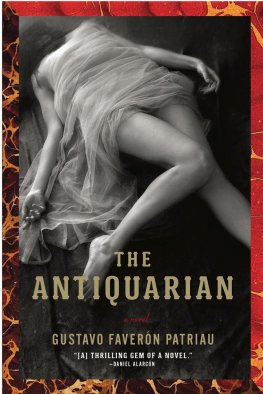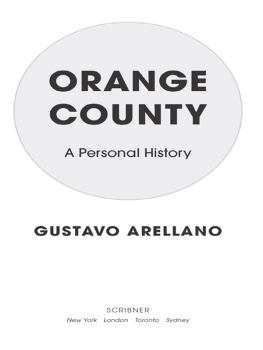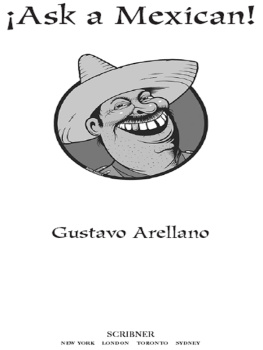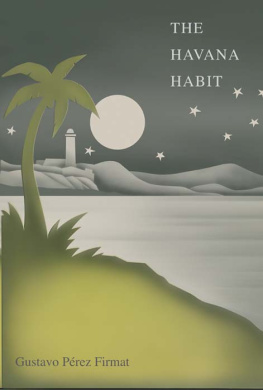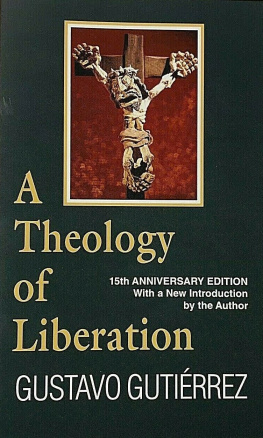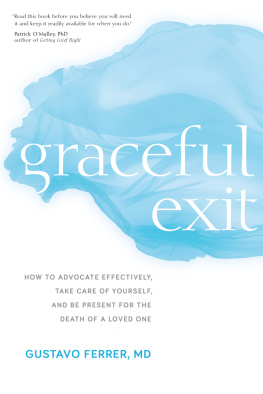Gustavo Favern Patriau
The Antiquarian
Every time you name yourself,
you name someone else.
Bertolt Brecht
How can I speak of love, of your Kingdoms tender hills,
when I live like a cat on a pole surrounded by water?
How can I call the hair, hair
the tooth, tooth
the tail, tail
and not ever name the rat?
Antonio Cisneros, Oracin
According to Conrad Lycosthenes wife, who was a foreigner, the women of her country used to lay eggs like hens. Conrad killed her and on her deathbed found a yellow egg and through a crack in the shell saw a sleeping face that was identical to his own. Ramihrdus of Cambrai was born of a virgin hen and they killed him: 1076. Gherardo Segarelli preached to the wise men in the barn and they killed him: 1300. Fra Dolcino bred chickens and roosters and they killed him: 1307. This is what I hear: Jan Hus made Peter crow thrice and they killed him: 1415. Jacob Hutter disemboweled his disciples and they killed him: 1536. Anne Askew quenched the thirst of her chicks with her own blood and they killed her: 1546.
This is what Ive been hearing for an indeterminable period of time. I open and close my eyes and then I open them again. I dont know if minutes, hours, or weeks have gone by. In the penumbra, as in the light, I hear the same list unraveling: Nicholas Ridleys feathers were plucked for being the king of the Jews and they killed him: 1555. Gioffredo Varaglia bought thirty hens from Judas and they killed him: 1558. Bernardino Conte named his first child Magdalene and they killed him: 1560. From time to time, a gruff, stammering voice cuts in and out, and I open my eyes to see the room I am in. On certain occasions I notice that night has fallen, or perhaps that dawn has already come. I then reach the realization that I am in a hospital. And I listen: Diego Lpez founded his church with the effigy of a sparrow-hawk carved in stone and they killed him: 1583. I fall asleep, and in my dreams I recognize that I am in another hospital, one thats larger and ever bustling. And I recognize that its my own voice that Im hearing. My face is bandaged: the strips of gauze press against my nose, ears, and eyes. Thats why its hard to look at objects. But nevertheless I look. And when my gaze ventures beyond the bandages, the gauze feels like a half-decayed peel that separates the outer world from the inner, distinguishing reality from dream from memory. In these early moments I dont know which is which. Nor do I know (as of now) how long I have been lying in this bed and why I am here in this hospital. Days go by and objects gain clarity: there are doctors and nurses who tend to me, although no one comes in to visit me my wife died years ago. Was it in this hospital or was it in another? I dont know. I do know that Giordano Bruno invented a system to remember everything using only the feathers on one wing and they killed him: 1600. Bartolomeo Coppino wrapped a crown of thorns around his crest and they killed him: 1601.
Of the doctors who come to see me, one always seems to be smiling and the other shows no expression whatsoever on his face, like hes wearing a porcelain mask. Days ago I asked him to bring me a pen and paper, and he in turn tasked a nurse to provide me with notebooks and pencils, and after spending three days scribbling, this morning I finally decided to write. Bartholomew Legate censored the plebeians squawks and they killed him: 1612. I write down this first line: It is an ancient story, which for others commenced centuries ago, and for me, at least fifteen or twenty years back. Then I cross out that phrase and write a different oneThree years had gone by since the night when Daniel killed Juliana, and on the telephone his voice sounded like someone elsesbecause I dont want to begin my story by way of hyperbole. I dont wish to tell what happened centuries ago. If at times I revert to the prehistory of my story, it is for the sole purpose of gaining precision. Suffice it to say that one morning, four weeks ago (now I am certain), I awoke calmly, routinely, not in this bed, but in the one in my house, as is to be expected, and I was pouring myself a cup of coffee when the telephone rang.
Three years had gone by since the night when Daniel killed Juliana, and on the telephone his voice sounded like someone elses. As if nothing had happened, he called to invite me to lunch. As if lunch with him still meant going to a casually chosen restaurant or to his parents house, where we used to hang out, surrounded by shelves packed with books, manuscripts, notepads, and bundles of papers folded into quarters, and corbels stuffed with thousands of volumes with amber spines, cracked leather covers, and glistening dust jackets. As if visiting him still meant, like it did before, ascending that wrought iron spiral staircase toward the library-bedroom in which Daniel used to spend every waking hour of the day, day upon day, week after week, deciphering marginalia in tomes that no one reads anymore, having breakfast and lunch in his pajamas, putting his feet up on the desk, with a magnifying glass in his left hand and an expression of astonishment rippling across his face. Back then, it did not mean entering that awful place where they had interned him, or rather, where he had interned himself in order to escape an even more confining prison.
Daniel had been my closest friend since our early college days. We were inseparable during those now distant years, when our vocations were being decided and with them, our lives. I chose psychology, thereafter psycholinguistics, and barely had I left the department when I married an irresistible, elegant colleague who fell terminally ill and died two years later, leaving me alone in a house I no longer recognized, with a collection of letters from lovers who had given her more affection than I had and afterward I no longer had the strength to build another relationship that would not decline into brevity and anonymity. Daniel, abstaining from juvenile engagements, was almost immediately seized by the study of history, books, and antiquities. He delved into a world of frantic and febrile readers who would consume tortuous volumes with the voracity of multi-cephalic beasts that spent their existence submerged in archives and hundred-year-old catalogues, or in meetings of bibliophile relic-traffickers, scholars who would purchase entire libraries from the widows of their dearest friends, paying derisory sums, in perpetual search for the coveted uncut tome that, once acquired, they could deflower with a pair of shears or with a blade in the obscurity of some dim den.
Daniel was younger than all of them they were old enough to be his parents or grandparents but for some reason they treated him as if he were an old Sherpa on some wilderness expedition into which they had accidentally, unfortunately or perhaps cunningly ventured while hiding certain objectives that none of them dared confess. One of them was Glvez, a retired pettifogger who, then and for many years now, has divided his time between practicing ornithology and hunting incunabula and ecclesiastic archives, a solitary and despotic soul who obeyed only his own intuitions, Daniels silent admonitions, or the whims of his old maid of a daughter, his sole companion at home. Another of them, Mireaux, was the hunchbacked proprietor of a conservative tabloid aristocratic in appearance, abounding with arithmetical phrases and intransigence, he as much as his paper and this man possessed a high-pitched voice that seemed to squeak out of his nose or escape through the folds of corrugated skin that covered his throat. The third, Pastor, was an ex nautical captain, older than Daniel but younger than the others, who had retired from the Navy years ago in order to dodge his transfer to the Red Zone a destination that officers back then, though really not that long ago, understood as a deadly curse, if not a sentence to perpetual horror. Pastor moved in semicircles when he walked and, with his outstretched fingers, drew spherical flowering figures in the air as he spoke that is, when he produced the whine of that dark and undulating voice of his, like the squirting of squid ink, which he proffered each time he wished to lay to rest his discrepancy with other people over a topic that had become the center of a dispute.

